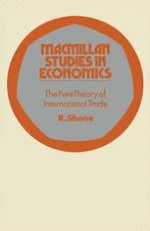1972 | OriginalPaper | Buchkapitel
Comparative Advantage
verfasst von : R. Shone
Erschienen in: The Pure Theory of International Trade
Verlag: Macmillan Education UK
Enthalten in: Professional Book Archive
Aktivieren Sie unsere intelligente Suche, um passende Fachinhalte oder Patente zu finden.
Wählen Sie Textabschnitte aus um mit Künstlicher Intelligenz passenden Patente zu finden. powered by
Markieren Sie Textabschnitte, um KI-gestützt weitere passende Inhalte zu finden. powered by
In 1776 Adam Smith argued that if a country could produce a good cheaper than a second country, and if the second country could produce a different good more cheaply than the first, it would be to the advantage of both countries if they specialised in the good they could produce cheapest, and traded. For example, the tropics are more suited to growing bananas than the temperate zone and with the same amount of labour the tropics can produce far more bananas than can the U.K. On the other hand the U.K. is more suited to producing machine goods and with the same amount of labour the U.K. can produce more machinery than can a tropical country. It will be of obvious advantage to both countries to employ the division of labour and to produce the good in which each has an absolute advantage and undertake international exchange. The qualification ‘absolute’ is necessary because the question arises, as Torrens and Ricardo pointed out:1 what if a country can produce both goods in greater amount with the same labour as a second country – will trade cease under these circumstances? Ricardo argued that under these conditions it would be to the (possible) advantage of both countries if they specialised in the good in which they had a comparative advantage.
